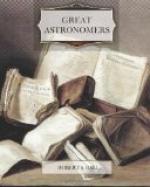[Plate: Tycho’s mural quadrant picture, Uraniborg.]
Tycho had many scientific friends in Germany, among whom his work was held in high esteem. The treatment that he there met with seemed to him so much more encouraging than that which he received in Denmark that he formed the notion of emigrating to Basle and making it his permanent abode. A whisper of this intention was conveyed to the large-hearted King of Denmark, Frederick II. He wisely realised how great would be the fame which would accrue to his realm if he could induce Tycho to remain within Danish territory and carry on there the great work of his life. A resolution to make a splendid proposal to Tycho was immediately formed. A noble youth was forthwith despatched as a messenger, and ordered to travel day and night until he reached Tycho, whom he was to summon to the king. The astronomer was in bed on the morning Of 11th February, 1576, when the message was delivered. Tycho, of course, set off at once and had an audience of the king at Copenhagen. The astronomer explained that what he wanted was the means to pursue his studies unmolested, whereupon the king offered him the Island of Hven, in the Sound near Elsinore. There he would enjoy all the seclusion that he could desire. The king further promised that he would provide the funds necessary for building a house and for founding the greatest observatory that had ever yet been reared for the study of the heavens. After due deliberation and consultation with his friends, Tycho accepted the king’s offer. He was forthwith granted a pension, and a deed was drawn up formally assigning the Island of Hven to his use all the days of his life.
The foundation of the famous castle of Uraniborg was laid on 30th August, 1576. The ceremony was a formal and imposing one, in accordance with Tycho’s ideas of splendour. A party of scientific friends had assembled, and the time had been chosen so that the heavenly bodies were auspiciously placed. Libations of costly wines were poured forth, and the stone was placed with due solemnity. The picturesque character of this wonderful temple for the study of the stars may be seen in the figures with which this chapter is illustrated.
One of the most remarkable instruments that has ever been employed in studying the heavens was the mural quadrant which Tycho erected in one of the apartments of Uraniborg. By its means the altitudes of the celestial bodies could be observed with much greater accuracy than had been previously attainable. This wonderful contrivance is represented on the preceding page. It will be observed that the walls of the room are adorned by pictures with a lavishness of decoration not usually to be found in scientific establishments.




